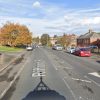
'Crucial part' of Exeter's cycle network set to be approved
A new cycle route along one of Exeter’s busiest residential streets is expected to be approved next week.
Devon County Council says the proposed 700-metre stretch along Rifford Road, between the junctions with Ludwell Lane and Honiton Road, is said to form a “crucial part” of the city’s north-to-south E12 route.
Once completed, it will create a continuous route between Polsloe Bridge station and the new railway station at Marsh Barton.
The £1.7 million scheme, a third of which is funded by the Department for Transport, will go to the council’s ruling cabinet for approval on Wednesday [10 May] following a recommendation Exeter’s highways and traffic orders committee in January.
Space will be made for the two-way cycle track by removing the “unnecessary” central hatched area of Rifford Road and moving the traffic lanes and parking bays across. Two active lanes will be retained for motor vehicles.
However, it will come at the expense of 16 on-street parking spaces which need to make way for the new layout, four of which are to be removed for new driveways requested through a public consultation.
A report acknowledges this is a “contentious issue as many residents feel the current number of parking spaces is inadequate,” adding: “Some respondents were concerned that this situation will be made worse with the removal of spaces following delivery of the scheme.”
But it claims the proposal is “well supported, with 58 per cent of respondents stating they would use it, 34 per cent stating they would not use it and eight per cent stating they may use it.”
Recommending approval, it states: “There is currently an absence of coherent north/south cycling routes within the city. This strategic route creates improved links between residential areas and key employment sites as well as linking with public transport at Pinhoe and Marsh Barton rail stations.
“In addition, the route could be used as part of education journeys to several primary and secondary schools in the city.”
The scheme is the latest in a series of active travel [cycling and walking] improvements made to the city’s roads since the start of the pandemic, most notably the initially temporary east to west E9 route from Pynes Hill to the city centre that has since been made permanent.
A scheme to make Magdalen Road permanently one-way is also nearing completion.
However, not everyone has welcomed the changes. One councillor previously claimed the schemes in Exeter may have led to a “over a million miles” a year extra being driven by taxis navigating round additional one-way systems.
But campaigners say that by segregating cars and bicycles, more people feel able to cycle to work or school, thus reducing congestion and pollution in the process, while also improving health.
By Ollie Heptinstall, Local Democracy Reporter.














